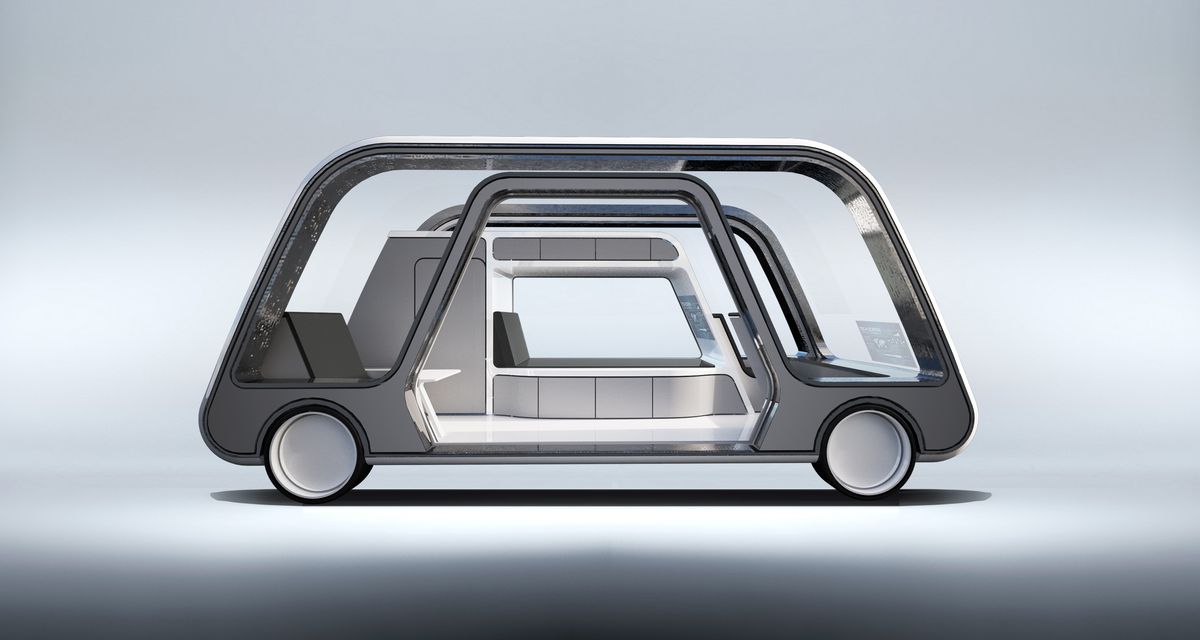The future of travel may be in outer space, or it could be in a self-driving car. That’s the hope of the Autonomous Travel Suite, a driverless mobile hotel room that provides door to door transportation.
Recently named one of three finalists in this year’s Radical Innovation Awards, the Autonomous Travel Suite was developed by Steve Lee of Los Angeles-based Aprilli Design Studio. Instead of heading to the airport, Lee envisions vehicles picking up travelers from their homes in solar-powered electric vehicles that shuttle them to their destination in micro hotel rooms.
Each mobile hotel room features a memory foam mattress for sleeping, a kitchen and mini bar, storage for luggage, a washroom, a toilet, and a seating area for working or entertainment. The car’s windows use smart glass that can dim for privacy, and the Autonomous Travel Suite could be available in different room types (single, family, pets, etc.) and various unit sizes at different price points. Customized equipment—like a TV or an extra bed—could also be available upon request, allowing travelers to work on the road and avoid stopping for bathroom breaks.
/cdn.vox-cdn.com/uploads/chorus_asset/file/12321073/ATS_ELEVATION.jpg)
Once at your destination, the Autonomous Travel Suite would arrive at an Autonomous Hotel facility and dock into what Lee calls a “parent suite.” Together, the car and the parent suite would become a larger, standard hotel room, and the Autonomous Hotel would provide expected amenities like a gym, spa, meeting rooms, and dining facilities.
Lee contends that the Autonomous Travel Suite would be cheaper than many hotels because it combines the price for transportation and room stays. The self-driving suites would also provide unlimited luggage space for traveling, privacy and flexibility for families or groups, and eliminate security or flight delays.
/cdn.vox-cdn.com/uploads/chorus_asset/file/12321079/ATS_HOTEL.jpg)
Fully autonomous cars may have not truly hit the road in significant numbers yet, but it’s not far off. As we’ve reported, autonomous vehicles promise to decrease car ownership, narrow streets and eliminate parking lots, and dramatically reshape our cities. A few cities already have driverless cars on the streets, albeit in test mode; Las Vegas has a Navya self-driving minibus, San Francisco boasts General Motors’ Cruise ride-hailing service, and Waymo’s family-focused Chandler, Arizona–based pilot program uses no human operators in its Chrysler Pacifica minivans.
The Autonomous Travel Suite would likely be most successful once more self-driving cars and electric cars are on the road. It could also be limited to regions of the country that are the most dense since it requires driving long distances between large cities, and there’s no real explanation for how you might recharge the car if there’s not enough sun and don’t have an Autonomous Hotel nearby. But the idea is interesting, if nothing else because it rethinks what the future of travel might look like.
The winner of the 2018 Radical Innovation competition will be announced on October 3.
/cdn.vox-cdn.com/uploads/chorus_asset/file/12321081/ATS_UNIT.jpg)
/cdn.vox-cdn.com/uploads/chorus_asset/file/12321087/ATS_INTERIOR.jpg)
